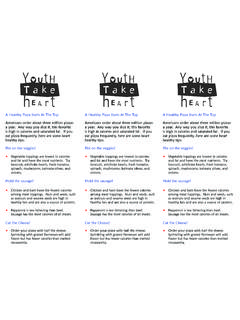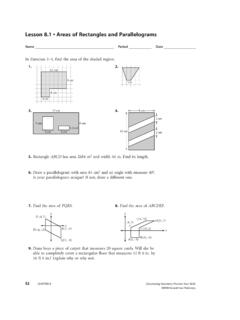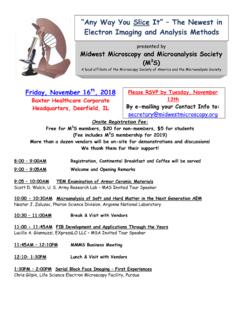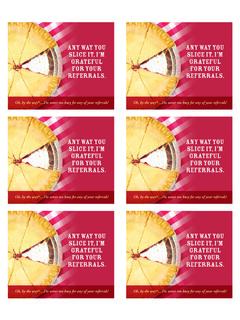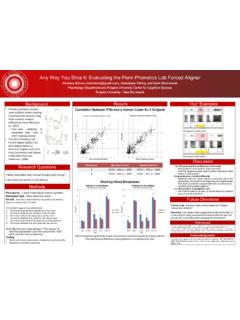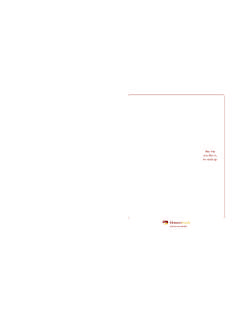Transcription of Any way you slice it, meat is BAAAAD!
1 Volume 40 - Spring 2008 Special issue: Pages 2, 3, 4, 11 Any way youslice it, meat isBAAAAD!.. For For the And for you! 2 Printed with vegetable-based ink on recycled paper. Vancouver Humane Society ~ Volume 40 - Autumn 2008 Editorial: The skinny on fatty chickensSpecial OccasionsCathy Morton, in honour of Debra Probert sbirthday;Casey & Riggs Meinardus & Milo McGarvie;happy and healthy dogs that want to helpother less fortunate pets, in honour ofChristmas;Gayle Poznikoff, in honour of David Jones atChristmas;Joan Downey, in honour of Bruce Downey atChristmas;Anonymous, in honour of Shannon Marler atChristmas;Anonymous, in honour of Mark Hurtubise andFranklin at Christmas;Jaya Panwar, in honour of Semira Salehie atChristmas;Anonymous, in honour of Ann Axelson;Kristi Ferguson, in honour of Rob Ferguson atChristmas;Christmas gift in honour of Suzanne McGinty;Anonymous, in honour of Tom;Anonymous, in honour of Taylor Steele;Anonymous, in honour of Lauren Steele;Anonymous, in honour of Judy Mason.
2 Staff of Surgical Daycare at Mount Saint JosephHospital, in honour of Michelle Donnelly sretirement;Stacey & Simon, in honour of Sue Castell;Stacey & Simon, in honour of Chris Buckham;Anon, in honour of Lenka of Imaging Students of RobartsResearch Institute, in memory of Louise Yi Du;Anonymous, in memory of Spencer Knowles;Harry and Diane Jones, in memory of BennieNendick;Roslyn Jackson, in memory of Donna Bourne;Norene Gilletz, in memory of Robert DentonMcCullough;Karen Toddington Schwartz, in memory ofMurray;Dale Stromberg, in memory of Willow;Leah Skretkowicz, in memory of Shadow;Leah Skretkowicz, in memory of Bill;Nancy Callan, in memory of Molly;Linda Sewell, in memory of Tabitha;Wendy Schattenkirk, in memory of DawnCassidy;Jackie Weiler & Willy Law, in memory ofJethro;Kaylee Yochim, in memory of Bobby;Anonymous, in memory of Hannah Elliott;Shirley and Ian Iverson, in memory of WallyIverson;Peter Fricker, in memory of Magoo;Debra Probert, in memory of sweet Magoo;Debra Probert, in memory of Mulder;Diane and Allan Ferrell, in memory of Ivy Fales& Alan Clarke;Diane and Allan Ferrell, in memory of Suzi;Martin Puterman, in memory of Coker;Colin & Laura Jackson, in memory of abused,neglected and forgotten chickens;Valerie Wallach, in memory of Alex Wallachand his cat, Kajun;Irina Reid, in memory of Jeani Read;Arthur Trenholm, in memory of Joey;Shoshana Somerville, in memory of Dusty RoseBud;Scott-Bathgate Ltd.
3 , in memory of DawnCassidy;Kris Hans and Perry Walker, in memory you to the following generous businesses whichdonate directly or indirectly through owners or employees:Elan RecordsJan Corkan IncorporatedSparkleJess DesignsGryndstone & Fusspot ( )Kama Natural SoapsBuckland Southerst GalleryHarry Sommerfeld MasonryKama Natural Soaps ( )Deer Lake Management Association for Community InclusionHealth studies linking the con-sumption of meat with variousdiseases from cancer to heartdisease to diabetes seem to appear inthe media on an almost weekly usually focus on the dangers of redmeat and often recommend that peopleeat chicken is chicken really a better alterna-tive? In fact, poultry consumption comeswith its own health concerns, not to men-tion a host of ethical issues relating to theenvironment and animal , long touted as a lean, low-fatalternative to beef, now turns out be a lotchubbier that it used to be.
4 Britishresearchers at London MetropolitanUniversity found that in 1970 a chickencontained grams of fat per 100 grams,compared with grams in a supermar-ket bird in 2004. Over the same period,the amount of protein fell by more than30 per cent from grams per 100grams to For the first time sincerecords began in 1870, a typical chickennow has more fat than Michael Crawford, who ledthe research team said, "The public thinksof chickens as lean products and a muchhealthier alternative to red meat. But wefound that typical supermarket chickensare very fatty."The reason, say the researchers, ismainly intensive poultry farming. Theidleness imposed by factory farming andmodern feeds are producing obese just can t move around scientists at the AgricultureResearch Service (ARS) found the sameproblem. The ARS reported that "modernbroiler/breeder chickens don t adequate-ly balance their feed consumption tomatch their energy requirements.
5 "This of course doesn t count the fatadded when chickens are breaded, deep-fried and served up as nuggets at youraverage fast-food outlet. Anyone hopingthat this is a healthy alternative to beef(or anything else) is kidding those concerned with the ethicaland environmental dimensions of con-suming chickens, there is, of course, evenmore to consider. Because broiler (meat)chickens are bred for rapid growth theydevelop painfully weakened bones andcirculatory problems from rapid weightgain. In 1950 it took 84 days for a broilerto reach market weight. Today it takes 38to 40 days. At the slaughterhouse they are hungupside down on metal shackles anddragged through an electrical stun bath,having their throats slit and put in a scald-ing tank for feather removal. UK poultryresearchers describe the shackling as caus-ing "inevitable stress, pain and trauma." Animal welfare aside, modern poultryproduction is responsible for substantialenvironmental degradation.
6 Intensivepoultry rearing produces massiveamounts of excess manure that can leachnitrates, phosphorus and heavy metalsinto groundwater. The manure also emitsammonia, contributing to air , like all livestock production, thepoultry industry produces greenhousegases contributing to global warming. Whether it s burgers or nuggets, theconsumption of meat is not good forhuman health, animal welfare or the envi-ronment. Vancouver Humane Society ~ Volume 40 - Spring 2008 Printed with vegetable-based ink on recycled 3 The rising consumption of meat is driv-ing the expansion of factory farmingaround the world. This is not only caus-ing animal suffering on a massive scale,it is also damaging our environment research, most recently fromthe United Nations, has shown that mod-ern meat production causes serious envi-ronmental damage and is a major contrib-utor to global this, some environmentalgroups have been slow to encouragelower meat consumption as a remedialmeasure.
7 Fortunately this is beginning tochange. Greenpeace, for example, recently pub-lished a report, Cool Farming, which calledfor a reduction in meat consumption tohelp reduce greenhouse gas David Suzuki Foundation challengespeople to at least have one meat-free dayper week. A few organizations, such asEarthsave Canada, have long champi-oned a plant-based diet as a vital way tohelp the environment and a prestigious medical journal, TheLancet, has published research calling fora ten per cent cut in global meat con-sumption to slow down global , the chairman of the spanel on climate change, recently calledon the world to please eat less meat toaddress the welfareThe cruelty of factory farming has longbeen an issue for animal welfare groups,but with global meat consumptionexpected to double in the next 50 years,the situation is getting worse every farming methods are beingadopted by developing countries likeChina and India, where the demand formeat is skyrocketing.
8 Billions more ani-mals will suffer as a international animal welfare organ-ization Compassion in World Farming(CIWF) has called for developed coun-tries to cut meat consumption by one-third as a first step to slow the growth offactory farms. VHS supports CIWF sapproach and is urging Canadians to cutout or cut down meat healthMany studies have linked the overcon-sumption of meat to poor health, includ-ing an association with cancer and heartdisease. Most recently, the World CancerResearch Fund carried out a major studywhich found strong evidence implicatingmeat consumption with colorectal the , the John HopkinsBloomberg School of Public Health haslaunched a Meatless Mondays cam-paign, which has been adopted by 28schools of public day Don t forget international Meatout Dayon March 20. Meatout is the world slargest and oldest annual diet educationcampaign.
9 The purpose is to highlight thebenefits of a plant-based diet. For moreinformation visit resourcesEarthsave Canada ( )has a range of materials to help peopleswitch to a plant-based diet, including aVegetarian Directory for the GreaterVancouver area. Call 604 731 Vancouver Vegetarian Association( ) operates aVegetarian Resource Centre, with alibrary and store, offering advice on vege-tarian diets and matter with meatIt s a bigger problem than you thinkPage 4 Printed with vegetabled-based ink on recycled paper. Vancouver Humane Society ~ Volume 40 - Spring 2008 Last week, Rajendra Pachauri, thehead of the United Nation s NobelPrize-winning scientific panel onclimate change, asked the world to please eat less meat. Speaking at apress conference in Paris he said meatwas a very carbon intensive commodity, afact established by UN research showingthat livestock production creates moregreenhouse gases than the top man at the world s mostimportant agency dealing with climatechange (the planet s biggest problem) is urg-ing us all to cut meat consumption toaddress the issue.
10 Is the prime ministerordering Environment Canada to draftguidance for Canadian consumers? Is par-liament debating the matter? Are environ-mental groups demanding action?Unfortunately, Mr. Pachauri s plea willcause barely a ripple in political, media orenvironmental circles. Even being chair ofthe International Panel on Climate Change(IPCC) doesn t guarantee many peoplewill want to hear this particular inconven-ient truth. It s interesting to note that hefollowed his statement by saying: This issomething that the IPCC was afraid to sayearlier, but now we have said it. What was the IPCC afraid of? This has-n t been reported, but one could speculatethat the global livestock industry and oth-ers with a vested interest in meat produc-tion will not take kindly to Mr. Pachauri sremarks. Neither will the politicians theylobby, who also hate having to tell theircitizens they need to make lifestylechanges to save the planet.



